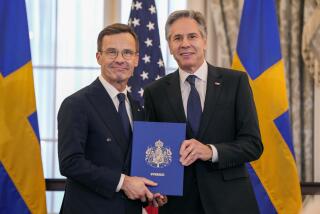EC Says Defense Arm Will Not Replace NATO
- Share via
MAASTRICHT, Netherlands — European Community leaders at the summit meeting Tuesday agreed on a new security role for their political union, a move designed to calm American fears about a separate European defense force.
In the defense section of the Treaty of Maastricht, the leaders designated the nine-nation security grouping known as the Western European Union as the EC’s defense arm. But officials emphasized that the union will not supplant the venerable North Atlantic Treaty Organization, which has guarded the peace in Europe for more than 40 years.
The Western European Union, the agreement said, will “elaborate and implement decisions and actions” of the new European union created here Tuesday. But the document also insisted that the role of the Western European Union be “compatible” with that of NATO.
Military forces allotted to NATO serve under their various national commands, except in wartime when they are passed over to NATO control.
A British diplomat here said the Western European Union’s new role will consist chiefly of maintaining a planning staff that could prepare military contingency operations that the 12-member EC might wish to undertake outside the NATO area--for example, in the Persian Gulf or Yugoslavia.
The union--whose members are Britain, Germany, France, Italy, Belgium, The Netherlands, Luxembourg, Spain and Portugal--has come into prominence, and controversy, after years in obscurity. It has been billed as the European pillar of the Atlantic Alliance, which would play an increasing role as the Soviet threat recedes and U.S. forces withdraw.
The French, and to a lesser degree the Germans, have pushed the union as the EC’s future, major military arm. But this primary role has been resisted by Britain, Italy and others who do not want to see NATO’s influence diluted.
The controversy was reflected in the language of the treaty being negotiated here: The French talked of the EC “instructing” the union to take on military tasks; the British wanted the word changed to “request.”
The British seemed to have won approval for their wording, and one official here talked of “winning the battle of defense.” But both the Germans and the French saw the final decision--and the altered wording--as a justification for their insistence on a new European defense pillar.
German Chancellor Helmut Kohl called the final wording “a very reasonable compromise.” And a French spokesman said, “For the first time, we see the objective: a clear, common defense. The WEU is an integral part of the European Union.”
The nine foreign ministers of the Western European Union, all EC members, held a joint meeting here Tuesday and approved the final wording.
Since the defense agreement is part of the Maastricht Treaty, it does not take effect until the broader document is signed.
Meanwhile, Greece will be allowed to join the union by the end of 1992, a condition that Athens insisted on for signing the overall treaty here. A senior British official said that Greece’s longtime adversary, Turkey, would be allowed to “participate” in union activities. Turkey, a NATO member, has faced Greek opposition to its EC application because of deep-seated political and military rivalries in the eastern Mediterranean.
More to Read
Sign up for Essential California
The most important California stories and recommendations in your inbox every morning.
You may occasionally receive promotional content from the Los Angeles Times.










